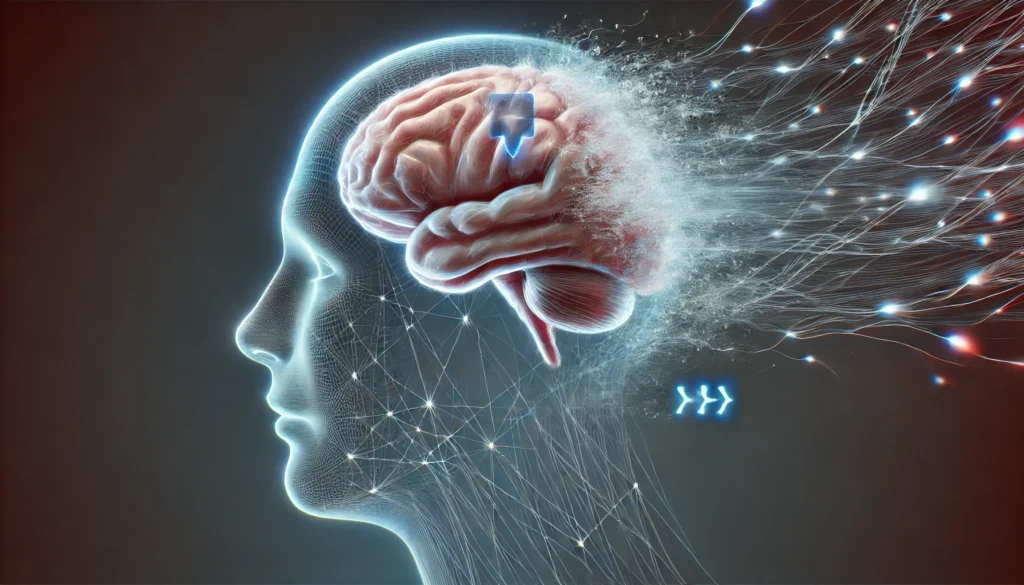The process of forming and articulating thoughts involves a complex interplay between different regions of the brain. Memory, attention, and language centers must work in harmony to produce coherent speech. When a disruption occurs in this network, it can lead to memory failure, such as forgetting words mid-sentence.
You may also like: Understanding the Science Behind Lost Memory
Memory and Language: A Delicate Balance
Memory is not a singular entity but a multifaceted process involving encoding, storage, and retrieval of information. The hippocampus, a critical region for memory formation, works alongside the prefrontal cortex, which manages complex cognitive behavior, decision-making, and moderating social behavior. This collaboration is essential for maintaining the flow of conversation.
When we speak, the brain retrieves relevant information from long-term memory, while short-term memory holds onto the current topic. Distractions or interruptions can disrupt this delicate balance, leading to a communication breakdown. The brain’s ability to juggle these types of memory simultaneously is what allows for seamless conversation, and any disruption can feel like hitting a mental roadblock.
The Role of Attention
Attention is the mental spotlight that allows us to focus on specific information while filtering out the irrelevant. This cognitive process is crucial for smooth communication. When attention wavers, it can result in mental blocks, where you momentarily forget what you were discussing.
Everyday stressors, multitasking, or fatigue can impair attention, increasing the likelihood of forgetting mid-sentence. Thus, maintaining mental focus is vital for coherent speech. The brain’s attentional resources are limited, and when overtaxed, they can lead to lapses in memory, making it difficult to retrieve the necessary information during conversations.
Neural Pathways and Speech Production
The production of speech is a highly coordinated task involving various neural pathways. The Broca’s area, located in the frontal lobe, plays a pivotal role in speech production and language processing. When neural pathways become overburdened or disrupted, it can lead to difficulties in articulating thoughts, resulting in a temporary loss of the conversational thread.
This intricate system requires synchronization between the brain’s hemispheres and is influenced by both internal and external stimuli. Understanding these neural dynamics can highlight why certain environments or situations might exacerbate the frequency of forgetting mid-sentence.
Common Causes of Forgetting Mid-Sentence
Understanding the reasons behind these memory lapses can help in addressing them effectively.
Cognitive Overload
In our fast-paced world, the brain is often bombarded with an overwhelming amount of information. This cognitive overload can lead to mental fatigue, where the brain’s processing capacity is maxed out, causing memory lapses. For instance, juggling multiple conversations or complex ideas simultaneously can strain cognitive resources, leading to forgetting words mid-sentence.
The modern digital age, with its constant notifications and streams of information, can exacerbate cognitive overload. This bombardment not only affects memory but also hampers the brain’s ability to prioritize information, leading to frequent interruptions in thought processes. Strategies like digital detoxes and focused work sessions can mitigate these effects.

Stress and Anxiety
Stress and anxiety are significant contributors to memory issues. These emotional states trigger the release of cortisol, a hormone that, in high levels, can impair cognitive function. This results in difficulty concentrating, which can manifest as forgetfulness during conversations.
Chronic stress can alter the structure and function of the brain, affecting regions involved in memory and learning. Techniques such as stress management, mindfulness, and cognitive behavioral therapy can be effective in reducing stress-related memory lapses. By understanding the physiological impact of stress, individuals can adopt practices that promote mental clarity and resilience.
Sleep Deprivation
Sleep is crucial for memory consolidation. During sleep, the brain processes and stores the information acquired throughout the day. Lack of quality sleep can disrupt this process, leading to attention issues and memory failures. Ensuring adequate rest can improve cognitive function and reduce instances of forgetting mid-sentence.
The stages of sleep, particularly REM and deep sleep, are vital for different aspects of memory processing. Sleep deprivation not only affects memory but also impacts mood and cognitive performance, creating a cycle of forgetfulness. Establishing a regular sleep routine and creating a conducive sleep environment can significantly enhance memory retention and cognitive clarity.
Historical Context and Current Trends
Throughout history, memory has been a subject of fascination and study. From ancient mnemonic techniques to modern neuroscience, our understanding of memory and its lapses has evolved significantly.
Ancient Mnemonic Techniques
Ancient scholars developed mnemonic devices to aid memory, such as the “method of loci,” which involves associating information with specific locations. These techniques underline the importance of structured memory recall, which can be beneficial in reducing mental blocks.
These ancient practices highlight the timeless quest for memory enhancement and suggest that structured recall methods can offer solutions to modern memory challenges. The adaptation of these techniques in contemporary settings, like using memory palaces for studying, demonstrates their enduring relevance and effectiveness in managing memory lapses.
Modern Neuroscience and Memory
Today, advances in neuroscience have provided deeper insights into the brain’s workings. Studies on neuroplasticity, the brain’s ability to reorganize itself by forming new neural connections, suggest that our brains can adapt and improve memory function. This understanding paves the way for interventions aimed at minimizing memory lapses.
Research in neuroplasticity underscores the potential for cognitive training and lifestyle interventions to enhance memory. Techniques like brain games, learning new skills, and engaging in creative activities can stimulate neural growth, offering hope for reducing forgetfulness. As neuroscience progresses, the potential for tailored memory enhancement strategies becomes increasingly viable.
The Digital Age and Memory
The digital era has introduced both challenges and opportunities for memory management. While digital tools can aid in memory retention through reminders and organizational apps, they can also contribute to cognitive overload. Balancing digital consumption with mindful practices is essential for maintaining cognitive health.
The influence of technology on attention spans and memory highlights the need for conscious digital habits. By leveraging technology wisely, individuals can enhance memory support while minimizing distractions. The integration of digital tools in memory training programs represents a frontier in cognitive enhancement.
Practical Tips for Reducing Memory Lapses
While occasional forgetfulness is normal, there are strategies to enhance memory and reduce the frequency of forgetting mid-sentence.

Mindfulness and Meditation
Practicing mindfulness and meditation can improve attention and focus, reducing the chances of mental blocks. These practices train the brain to concentrate on the present moment, enhancing cognitive function and memory retention.
Regular meditation practice has been shown to increase gray matter density in brain regions associated with memory and learning. By incorporating mindfulness into daily routines, individuals can cultivate greater awareness and improve their ability to recall information during conversations. Mindfulness practices also offer stress-reduction benefits, further supporting memory function.
Structured Communication
Organizing your thoughts before speaking can help maintain the flow of conversation. Using outlines or mental checklists can ensure that you stay on track and minimize forgetting words mid-sentence.
Techniques such as pre-planning key points or using visual aids can enhance clarity and reduce the cognitive load during discussions. Structured communication fosters confidence and reduces anxiety, creating a more effective conversational experience. By adopting these methods, individuals can navigate complex topics with ease and precision.
Lifestyle Modifications
Adopting a healthy lifestyle can have a positive impact on memory. Regular physical exercise, a balanced diet rich in omega-3 fatty acids, and staying hydrated can support brain health. Additionally, limiting caffeine and alcohol intake can prevent memory disruptions.
Physical activity promotes blood flow to the brain, enhancing cognitive function and memory. Nutritional choices, such as incorporating antioxidants and vitamins, can also bolster brain health. By making informed lifestyle decisions, individuals can create an environment conducive to optimal memory performance.
Future Implications in Memory Research
The future of memory research holds exciting possibilities. Emerging fields like biohacking and nootropic supplements offer potential avenues for enhancing cognitive performance.
Biohacking and Nootropics
Biohacking involves making small, incremental changes to optimize health and performance. This includes the use of nootropics—supplements designed to improve cognitive function. While research is ongoing, some nootropics show promise in enhancing memory and focus, offering potential solutions for those struggling with memory lapses.
The exploration of biohacking extends to personalized health strategies, where individuals can tailor interventions to their unique cognitive needs. As research advances, ethical considerations and long-term effects of nootropics remain focal points in the discourse on cognitive enhancement.
Technological Advancements
Technological innovations, such as brain-computer interfaces and AI-driven cognitive training programs, are on the horizon. These tools aim to enhance brain function and could revolutionize how we address memory issues in the future.
The integration of technology in cognitive training can offer personalized feedback and adaptive learning experiences, fostering memory improvement. The potential of AI in creating customized cognitive workouts represents a promising avenue for mitigating memory lapses. As these technologies evolve, they hold the potential to transform memory enhancement strategies.
The Interplay of Genetics and Memory
Genetic research is uncovering the intricate relationship between genes and memory function. Understanding genetic predispositions can inform targeted interventions and preventive measures for memory lapses.
The role of genetics in memory offers insights into personalized approaches for cognitive support. As genetic testing becomes more accessible, individuals may gain a deeper understanding of their cognitive strengths and vulnerabilities, paving the way for tailored memory enhancement strategies.

Conclusion
Forgetting what you were talking about mid-sentence is a common experience, often rooted in the intricate workings of memory, attention, and language. By understanding the underlying causes and implementing practical strategies, you can reduce the frequency of these lapses and improve communication.
As research continues to unveil the mysteries of the brain, new techniques and technologies promise to further enhance our cognitive abilities, paving the way for a future where memory lapses are a thing of the past. Embracing a proactive approach to cognitive health can empower individuals to navigate conversations with confidence and clarity, fostering more meaningful interactions.
Further Reading:
Memory Lapse or Dementia? 5 Clues to Help Tell the Difference
Is it normal to forget words while speaking? And when can it spell a problem?
One Weird Consequence Of The Pandemic? Forgetting Words
Important Note: The information contained in this article is for general informational purposes only, and should not be construed as health or medical advice, nor is it intended to diagnose, prevent, treat, or cure any disease or health condition. Before embarking on any diet, fitness regimen, or program of nutritional supplementation, it is advisable to consult your healthcare professional in order to determine its safety and probable efficacy in terms of your individual state of health.
Regarding Nutritional Supplements Or Other Non-Prescription Health Products: If any nutritional supplements or other non-prescription health products are mentioned in the foregoing article, any claims or statements made about them have not been evaluated by the U.S. Food and Drug Administration, and such nutritional supplements or other health products are not intended to diagnose, treat, cure, or prevent any disease.


